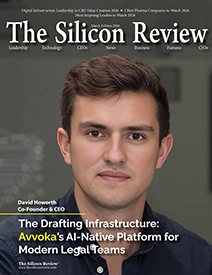Chloropy – Optimizing the Use of Crop Inputs for a Safer and Sustainable Future
The Silicon Review
![]()
Agriculture remains to be a great player in the generation of revenue and a source of food for many people all over the world. Over the past years, this sector has seen a lot of changes and advancement in the different farming approaches and techniques. For example, nowadays, there is the use of inorganic fertilizer, the consumption of reduced amounts of pesticides, the use of different tractors and machinery. The availability of such inputs has seen the need for the use of natural resources and process with aim of improving agricultural output and reducing costs. The use of modern technology in agriculture comes with a lot of benefits. Over the years, technology has proved to be extremely useful in the agricultural sector. Presently, farmers are able to grow crops in areas where they were thought could not grow, but this is only possible through agricultural biotechnology. Through technology, farmers are in a position to electrify every process for efficiency and improved production.
Chloropy is an early-stage deep-tech company. The companies primarily focused at solving key issues around indiscriminate use of crop inputs using cutting-edge technologies like robotics, computer vision, and artificial intelligence. It is interpreting images from drones, mobile phones, or other camera devices to get actionable insights. It also is developing a battery-operated semi-autonomous rover for the precise application of crop inputs.
Cutting-Edge Crop Input Technologies Offered
CIMS platform for aerial image analytics: Crop scouting is essential to monitor pests and diseases and take corrective actions if needed. The manual method of scouting is strenuous and prone to errors. Advanced tools like drones and object detection technologies are improving the data collection from farms. Traditional methods of crop scouting rely on manual sampling of a field. Observing plants and recording data physically is a strenuous and time-taking exercise. Moreover, manual data collection is inherently prone to errors. But, farmers and agronomists need information quicker to take meaningful actions on their farms to manage the crop efficiently. This can be achieved through digital tools like drones and object detection technologies. Drones coupled with object detection technology can automate the crop scouting process completely. Precise insights can be obtained in a few hours instead of a few days when done manually.
CIMS platform for fruit phenotyping through mobile-phone pictures: Collecting large-scale, field-based plant phenotypic data quickly, with sufficient confidence and precision in a reproducible manner is seen by plant breeders as a serious bottleneck during crop improvement. CIMS-Pheno is a simple and easy-to-use tool that solves this problem with pictures captured through mobile phones. CIMS-Pheno technology is powered by advanced computer vision and proprietary deep learning algorithms.
Semi-autonomous rover for crop management: While different stakeholders are trying to help farmers in decision-making, still large gaps exist resulting in poor crop management or low productivity. One of the few ways to improve productivity is to optimize input use, which can be achieved by applying the right quantity, at the right time, and at the right place. To address the key challenge of improving crop productivity, the company is building small, connected, portable, semi-automated rovers (or ground vehicles) to perform specific tasks in small-farm situations
Chlorophy | Leadership
Gajendra Babu is the co-founder of Chloropy. He has over 16 years of experience in the agrochemical and seed industry. His expertise ranges across biotech product development, insect resistance management, registration, regulatory affairs, and scientific outreach. In his last job, he worked for Syngenta in Singapore. There he managed research projects for registering Bt corn in India, China, and ASEAN. In mid-2019, he got attracted to the start-up world with a passion to solve real problems in agriculture. He joined the accelerator programs at Entrepreneur First (EF) and Antler in Singapore, where he met his co-founder to launch an agri-tech startup Chloropy, which is a portfolio company of Antler.
Gajendra has M.Sc. and Ph.D. in agriculture from Tamil Nadu Agricultural University (India), with a specialization in entomology.
![]()
Apporv Vaish is the co-founder of Chlorophy. Before founding Chloropy, he was a Research Engineer at Singapore University of Technology & Design (SUTD). He joined the accelerator programs at Entrepreneur First (EF) Antler in Singapore. Apoorv has earlier worked on designing robotic and computer-vision solutions for domains like defence, retail and construction. Most recently, he used drones to study tree topologies in forests around Barcelona to optimize timber used for construction
Apporv has Bachelors’s in Mechanical Engineering (BITS, Pilani, India) and Masters’s in Robotics from UPC, Barcelona (Spain).





_2025-12-15_12-44-58.webp)